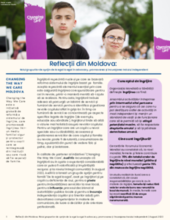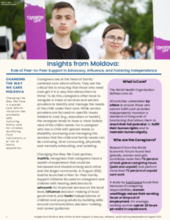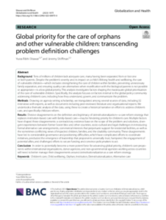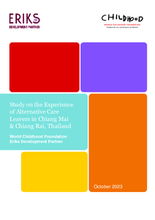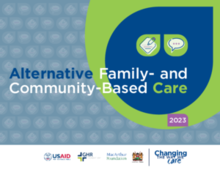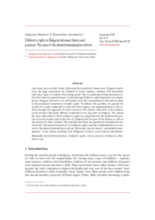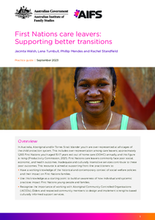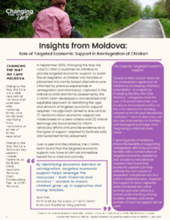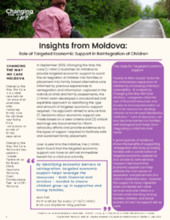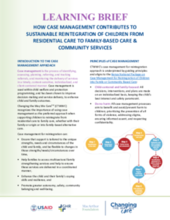Displaying 61 - 70 of 991
În perioada ianuarie - iunie 2023, Asociația de Suport Familial de Recuperare Timpurie a Copiilor cu Deficiențe de Auz și Văz ”AudiViz” a realizat un studiu care a avut scopul de a analiza perceptia parintilor și a copiilor/tinerilor cu dizabilitate de auz privind calitatea vietii lor, a serviciilor oferite de autoritățile publice și dacă acestea răspund nevoilor lor sau contribuie la sprijinirea familiei, la reabilitarea şi integrarea socială, educațională.
Caregivers are at the heart of family-centered care reform efforts. They are the critical link to ensuring that those who need care get it in a way that allows them to thrive. Changing the Way We Care Moldova’s partner, AudiViz, recognizes that caregivers have a wealth of experience that could be harnessed and shared among each other and the larger community.
This analysis investigates factors shaping the inadequate global prioritization of the care of vulnerable children.
The purpose of this study is to explore how growing up in private residential care in Chiang Mai and Chiang Rai provinces of Thailand has affected children’s well-being over time. The research provided an important opportunity for young people to describe and analyze their experience, as well as make their own conclusions and recommendations.
This handbook is a summarized, user-friendly version of the operating procedures for alternative family- and community-based care options. It provides an overview of each type of care, key considerations, and the process followed for placement. The handbook aims to provide an easy and quick reference to critical information and “how to” about alternative family- and community-based care placements.
In this article, the authors aim to analyse how the process of deinstitutionalization in Bulgaria relates to the concept of child’s rights articulated in the CRC on which it is based. They focus on children without disabilities, specifically children raised in small home centres (SHC2) subject to so-called residential care.
This resource is aimed at supporting front-line practitioners in Australia to have a working knowledge of the historical and contemporary context of social welfare policies and their impact on First Nations families and to use this knowledge as a starting point to build an awareness of how individual and systemic practices impact First Nations young people and families.
In September 2022, Changing the Way We Care (CTWWC) launched an initiative to provide targeted economic support to assist the reintegration of children into families or placement into family based alternative care. Informed by previous experiences in reintegration and information captured in the individual child and family assessments, the CTWWC team developed a standardized and equitable approach to identifying the type and amount of targeted economic support required.
In septembrie 2022, Changing the Way We Care (CTWWC) a lansat o inițiativă pentru a oferi sprijin economic direct în procesul de reintegrare a copiilor în familii sau plasament în servicii de îngrijire de tip familial. În baza experiențelor anterioare de reintegrare, dar și din informațiile extrase din evaluările individuale ale copiilor și familiilor, echipa CTWWC a dezvoltat o abordare standardizată și echitabilă pentru a identifica tipul și valoarea sprijinului economic direct necesar.
This learning brief reports on the reflection and shares a collection of case studies collated by caseworkers in Kenya. Using Most Significant Change Storytelling, the caseworkers, supervisors and program managers selected and discussed stories from their work. They discussed what lessons these stories and the discussion drew out about the case management practice. The each of the stories illustrates one or more of the case management steps.

